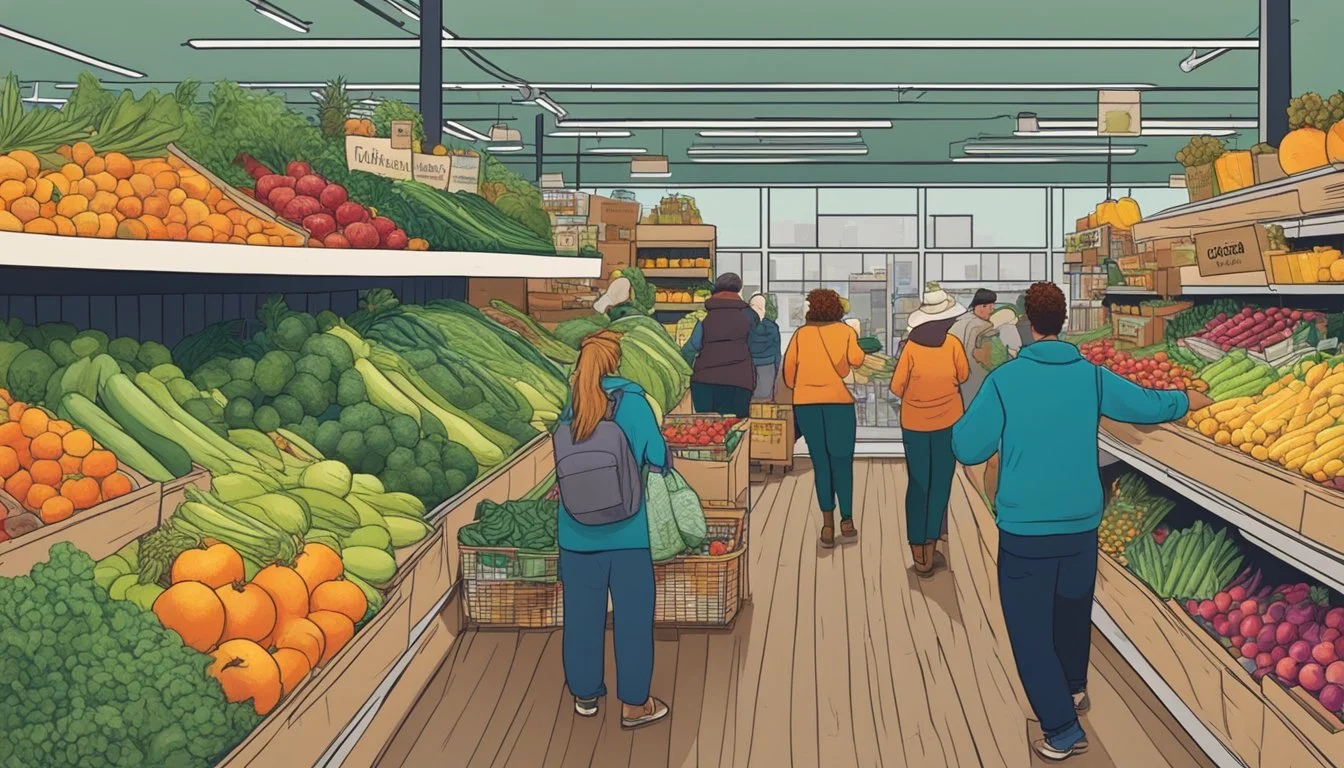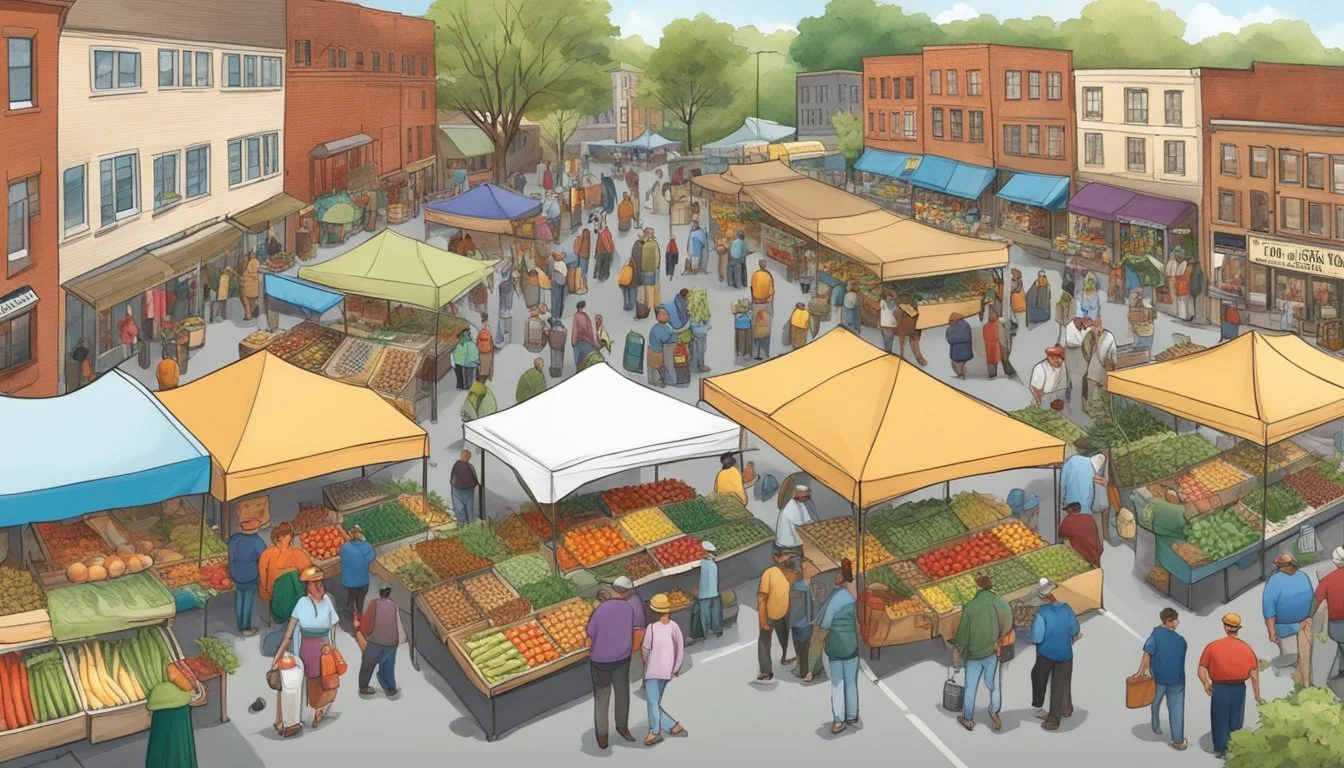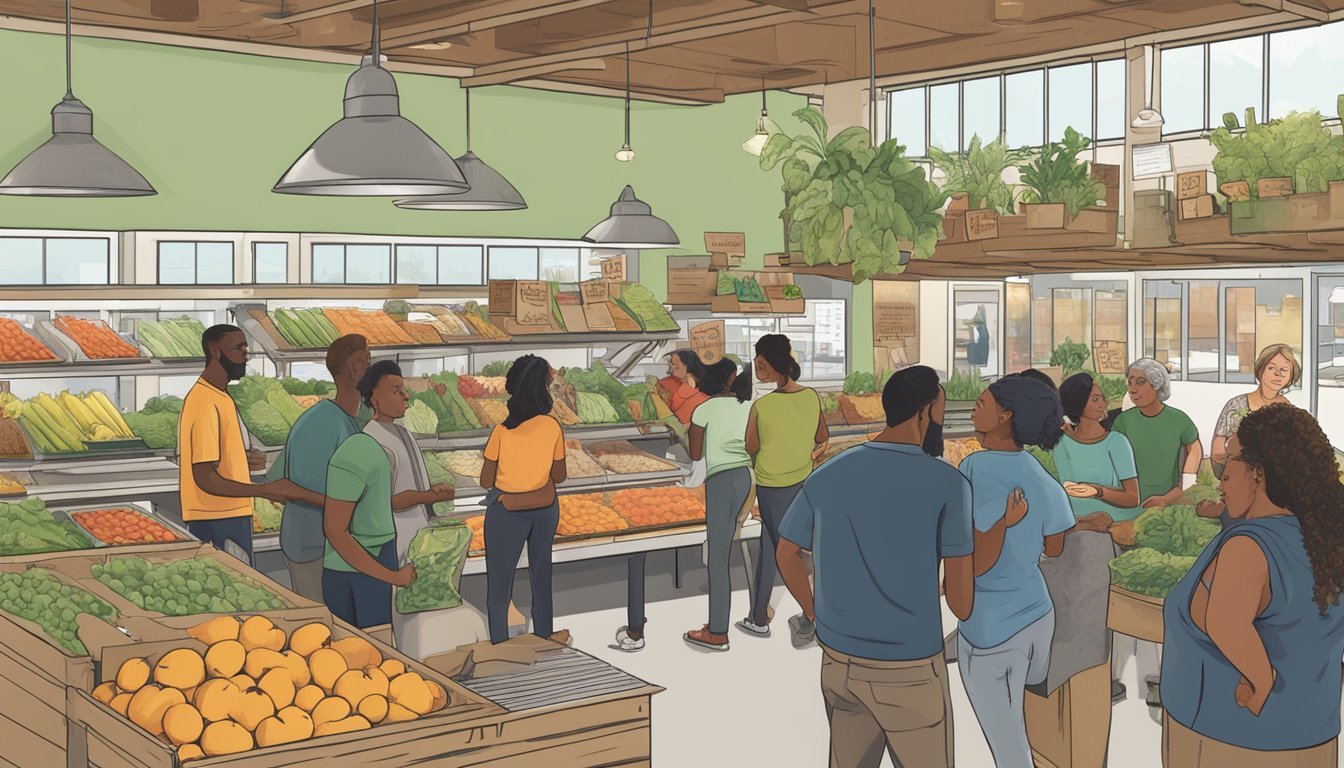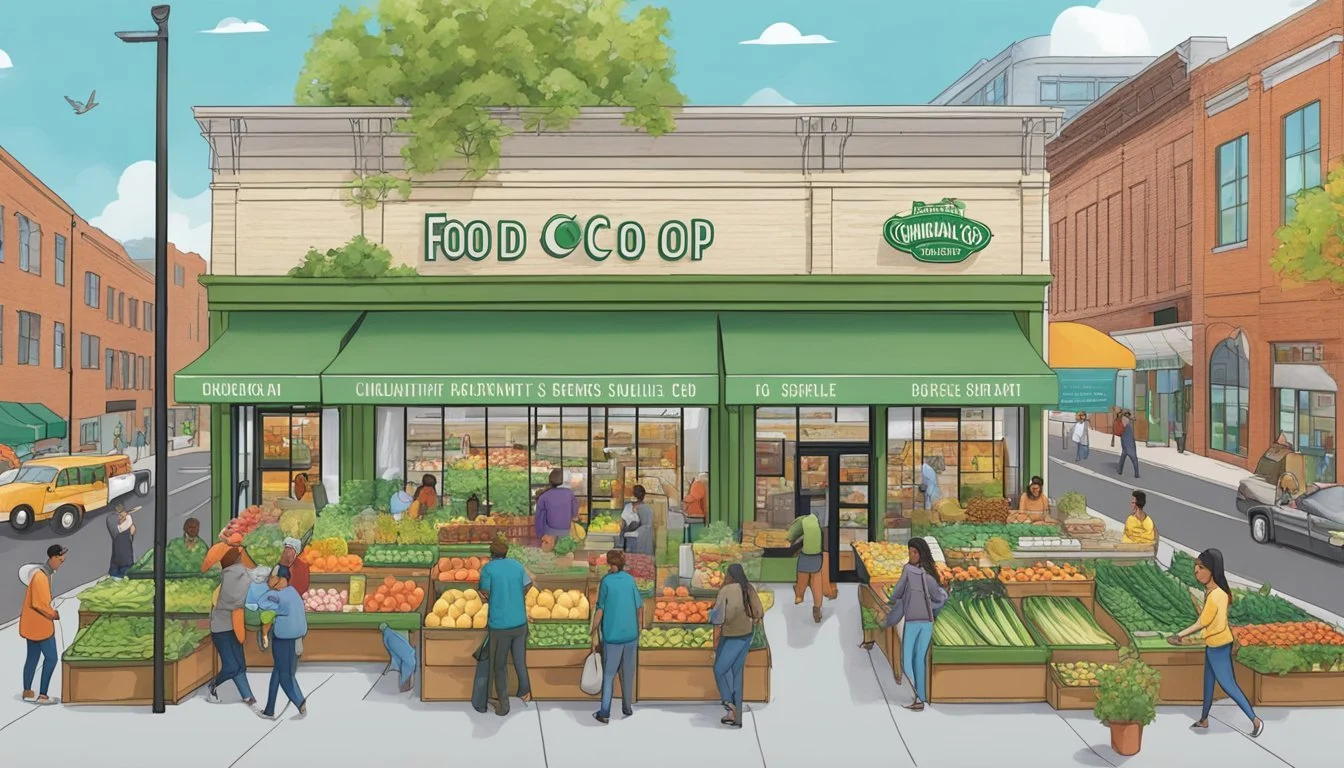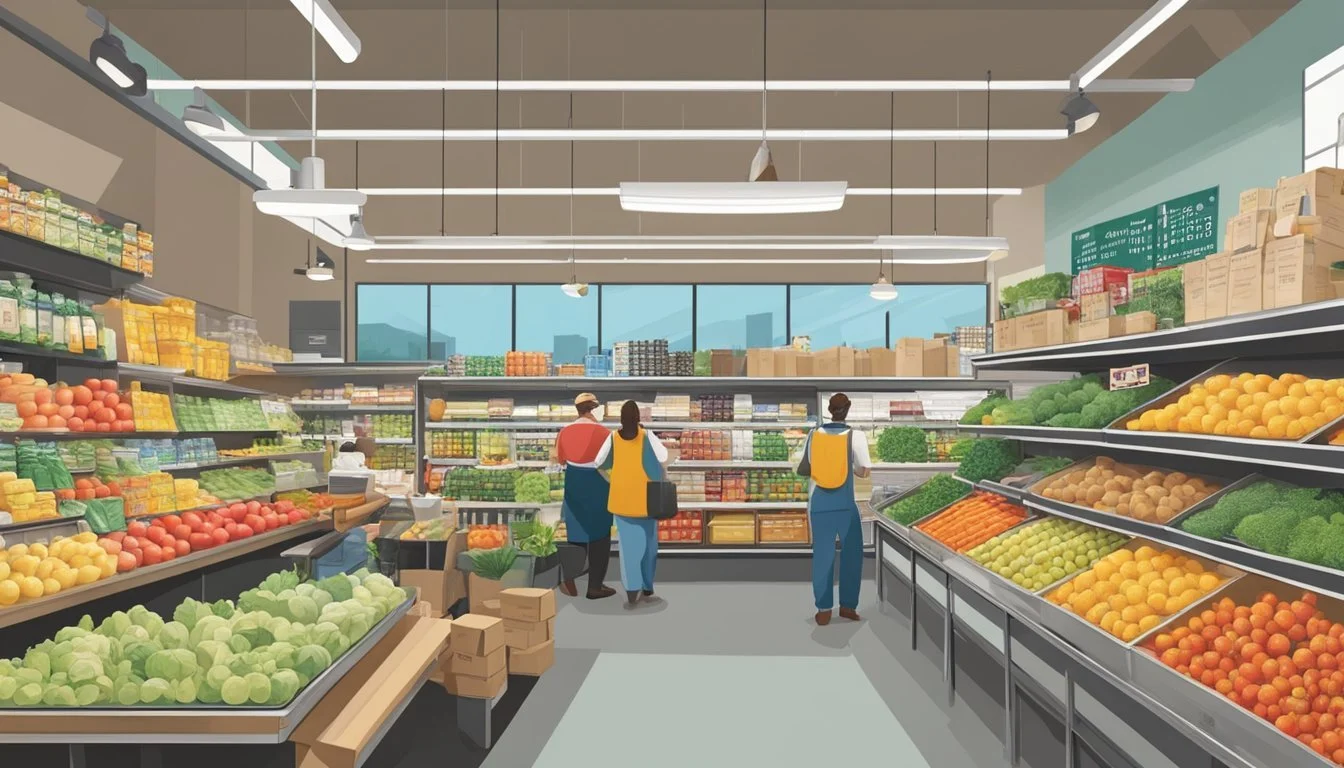Guide to Food Co-Ops in Cincinnati, OH
Your Local Shopping Solution
Cincinnati hosts a thriving community of food co-ops, entities that revolutionize the way consumers approach their grocery shopping. These cooperatives are vital in providing access to healthy, local food, all while emphasizing the importance of fair labor practices and sustainable agricultural methods. By focusing on community support and member-oriented services, Cincinnati's co-ops are not just food outlets but also social enterprises that invest in the local economy and foster a sense of community
At the core of Cincinnati's food co-ops is the promise of connecting producers and consumers within a dynamic local food system. The city's cooperatives, such as Our Harvest Cooperative, embody this commitment by creating family-sustaining jobs and implementing responsible growing practices. These co-ops offer various programs, from weekly harvest boxes to direct sales, ensuring residents can easily incorporate fresh, locally sourced produce into their daily diets.
The cooperative model in Cincinnati not only helps democratize food access but also supports an ethos of collaboration and shared ownership. Through member involvement and collective decision-making, these co-ops contribute to a more equitable and resilient food economy. They serve as hubs where residents can engage directly with their food sources, benefit from educational opportunities, and take active roles in shaping the future of their local food systems.
Understanding Food Co-Ops
Food cooperatives in Cincinnati not only exemplify a strong sense of community but also ensure that the local food system is robust through their support and outreach. They play a critical role in growing the local economy while providing high-quality and value-laden grocery options to their members.
History and Philosophy
The philosophy of food cooperatives revolves around the principles of community building and member control. Food co-ops typically emerge from a collective need to access better food sources and represent a community's decision to support both local producers and ethical practices. This method of operation can be traced back to the cooperative movement that began in the 19th century, and today's food co-ops in Cincinnati continue to embrace these roots by prioritizing local food and communal support.
Benefits of Joining a Co-Op
Joining a food co-op offers a myriad of benefits, both tangible and intangible. Members commonly enjoy:
Access to High-Quality Local Food: Direct partnerships with local farmers and producers ensure fresh, locally-sourced products, from produce to dairy.
Member Control: as co-op members, individuals have a say in business decisions, influencing the products and services offered.
Support for the Local Economy: By buying from local suppliers, cooperatives nourish the community's prosperity.
Education and Community Building: Most co-ops are committed to consumer education, providing valuable information on nutrition, food sourcing, and preparation. They also foster a sense of community through events and initiatives.
Food co-ops remain a viable and thriving component of Cincinnati's community, enhancing residents' connection to their food sources and each other.
The Role of Food Co-Ops in the Local Economy
Food co-ops in Cincinnati, OH, play a pivotal role in bolstering the local economy by supporting small businesses and fostering sustainable jobs through their operations and community-focused initiatives.
Supporting Small Businesses
Food co-ops benefit the Greater Cincinnati community by providing small, local farms and businesses with consistent and reliable marketplaces to sell their products. These cooperatives typically prioritize purchasing from local producers, which results in a significant portion of their revenue circulating within the local economy. By selling local food products, co-ops help to maintain the health and diversity of the Local Food System, which in turn supports community-based food producers.
Fostering Sustainable Jobs
In the realm of employment, food co-ops contribute to the creation of Sustainable Jobs by hiring local workers and offering equitable working conditions. Many co-ops operate on a model that encourages worker-owners, providing staff with a share in the profits and a voice in the operation of the business. This empowers workers and fosters a vested interest in the success of their co-op, enhancing job satisfaction and stability. Furthermore, these jobs often involve elements of Education for both employees and customers about the benefits of local, sustainable food systems.
Membership and Participation
In Cincinnati, OH, food co-ops cater to various participants including community members, workers, and consumers, focusing on sustainable practices and equitable distribution of profits. Joining a cooperative involves understanding membership processes, recognizing member benefits and responsibilities, and participating in the governance of the organization.
How to Become a Member
To join a food co-op in Cincinnati, an individual must typically fill out an application and pay a membership fee. The specific steps can vary by cooperative. For example, Our Harvest Cooperative requires prospective members to provide personal details and agree to the co-op's values. This process is designed to ensure that each member is aligned with the cooperative's goals of supporting local agriculture and fair labor practices.
Member Benefits and Responsibilities
Members of Cincinnati food co-ops often receive various benefits, such as:
Access to fresh, local produce
Ability to purchase shares in seasonal harvest boxes
Discounts on local foods and other products
However, members also have responsibilities. They are expected to contribute to the cooperative, often through:
Participation in member meetings
Volunteering time for cooperative initiatives
Voting on key governance decisions
Members help shape the future of the co-op through active engagement, contributing to a model that honors both land and labor.
Engagement and Governance
Cooperative members participate in the governance of the organization. They may attend meetings, engage in community education programs, and vote on important matters. For example, Our Harvest's Mondragon-style union co-op model emphasizes democratic governance, promoting worker and member participation. Governance structures vary from co-op to co-op, but they are fundamentally designed to support equitable decision-making processes and ensure that profits benefit the cooperative and community, rather than external shareholders.
Exploring Cincinnati's Food Co-Ops
Cincinnati boasts a variety of food co-ops that focus on providing residents with access to fresh, locally-sourced food. These co-ops operate with a commitment to sustainability and community well-being.
Clifton and College Hill
Clifton and College Hill are home to co-op initiatives such as the Weekly Harvest Box, which makes it simple for families to enjoy fresh, local produce. In these areas, patrons have the option to choose from small, medium, or large boxes tailored to meet the varying needs of individuals and large families alike. These boxes can be conveniently picked up at several locations throughout the greater Cincinnati area.
Pick-Up Locations: Multiple around Cincinnati
Box Sizes: Small, Medium, Large
Focus: Fresh, local produce
Northside and Avondale
In the Northside and Avondale regions, food co-ops like Our Harvest Cooperative work diligently to create access to healthy, local food. They prioritize land stewardship and fair labor practices. This worker-owned cooperative was established in 2012 and operates on a 12-acre farm that partners with other local growers to enhance the local food system.
Established: 2012
Practice: Responsible growing, fair wages
Products: Vegetables sold at farmers' markets, retail outlets, and through a subscription box program
These co-ops are instrumental in strengthening Cincinnati's local food system and providing residents with nutritious food options while simultaneously honoring the land and those who work on it.
Local Food Systems and Cooperatives
Cincinnati's vibrant local food systems and cooperatives play a crucial role in connecting consumers with fresh, locally sourced produce. They achieve this through innovative programs and a commitment to sustainable agriculture.
Connecting with Local Farms
Organizations like Our Harvest Cooperative serve as vital links between local farmers and the Cincinnati community. They support a network of farms, thereby bolstering local food security and economy. Consumers benefit from this relationship by gaining access to produce that is fresh and traceable back to its source.
Weekly Harvest Box Programs
Cooperative initiatives like the Weekly Harvest Box make it easy for families to incorporate local food into every meal. Customers can pick up a box filled with a variety of local produce from designated locations throughout Greater Cincinnati. This program offers different box sizes to cater to individuals as well as large families, ensuring that fresh food is accessible to all.
Promoting Responsible Growing Practices
Cooperatives such as Our Harvest not only focus on the economic aspects of local food distribution but also emphasize responsible growing practices. This includes creating job opportunities in agriculture that provide family-sustaining wages and promoting methods that honor the land. These practices contribute to a sustainable local food system that values both the environment and the community it feeds.
Retail Operations in Food Co-Ops
Food cooperatives in Cincinnati focus on providing fresh, local groceries while ensuring efficient distribution methods. They prioritize sourcing from local producers and developing reliable pick-up locations for member convenience.
Products and Sourcing
Food co-ops are dedicated to stocking a variety of fresh local food products including seasonal fruits and vegetables, artisanal cheeses, and handcrafted jams. They emphasize the direct relationship with local farmers and artisans to ensure their groceries meet a high standard of quality and sustainability.
Vegetables & Fruits: Sourced from local farms, focusing on seasonal availability.
Cheese: Selection of local and regional cheeses, from classic cheddars to specialty varieties.
Jam: A range of locally made jams, often featuring unique blends and flavors.
Retail operations negotiate with these providers to secure fair prices for both the producers and the consumers, supporting the regional economy and the co-op's members.
Pick-Up Locations and Distribution
Food co-ops in Cincinnati have established multiple convenient pick-up locations for their members. They ensure that these spots are easily accessible, fostering a seamless distribution process.
Central Storefront: Primary location where members can find the full array of products.
Satellite Pick-Up Points: Strategically located spots where pre-ordered groceries can be collected.
By implementing an efficient distribution system, food co-ops make it possible for members to receive their groceries in a manner that fits their schedules, enhancing the retail experience.
Education and Community Outreach
Cincinnati's food co-ops actively engage with the community through a variety of educational initiatives and outreach programs. They focus on empowering individuals with knowledge and skills in sustainable agriculture while fostering community involvement.
Workshops and Classes
Throughout the year, Cincinnati food co-ops offer workshops and classes related to sustainable agriculture and food management. They partner with educational institutions such as Cincinnati State's Sustainable Agriculture Management Program, providing practical experience to students. Classes typically cover a range of topics from urban farming techniques to cooperative business models.
Example Classes:
Urban Farming 101
Co-op Business Management
Organic Gardening Practices
Community Events and News
Community events serve as a platform to share knowledge, network, and celebrate local food culture. Co-ops utilize newsletters and social platforms to keep the community informed about upcoming activities and developments in Cincinnati's local food system.
Communication Channels:
Monthly Newsletters
Community Bulletin Boards
Social Media Updates
Apprenticeship Programs
Food co-ops in Cincinnati are dedicated to apprenticeship programs that offer hands-on training in the field. These programs are designed to support new farmers and cooperative members in gaining the experience needed to run successful farming operations and businesses.
Program Details:
On-site Training
Family-Sustaining Wages
Responsible Growing Practices
Collaboration and Growth
In Cincinnati, OH, food co-operatives have embarked on significant collaborations, focusing on building relationships with local businesses and expanding their reach. These efforts aim to support community growth, leverage cooperative principles, and ensure sustainability of both land and labor.
Building Relationships with Local Businesses
Food co-ops in Cincinnati have understood the value of synergy with local businesses. For instance, Our Harvest Cooperative has been a pioneer, connecting with local producers to create jobs that support families with fair wages. They emphasize responsible growing practices to honor the land and the people who work it. These cooperative efforts have led to the robust strengthening of Cincinnati's local food system, ensuring that the community benefits from high-quality, locally produced food.
Expanding the Reach of Food Co-Ops
The expansion of food co-ops in Cincinnati is notable, especially with programs like the Weekly Harvest Box from Our Harvest, making fresh, local food easily accessible to a broad spectrum of the population. The distribution network is consciously designed to be local, usually within 100 miles, supporting local agriculture and distribution chains, while simultaneously promoting living wage jobs in the farming and food sectors. Growth is further facilitated by addressing an essential environmental concern—the goal to eliminate all food waste from landfills, which reflects the community’s dedication to environmental sustainability and inclusive economic development.
Economic and Social Impact
Food cooperatives in Cincinnati are not only focal points for community engagement but also play a significant role in the local economy and social well-being. They tackle issues such as wage disparity and food scarcity, while fostering a cooperative spirit among members and employees.
Creating Family-Sustaining Wages
Cooperatives are known for advocating living wages and fair employment conditions. In Cincinnati, co-ops prioritize family-sustaining wages, ensuring that employees receive compensation that meets the cost of living and supports a decent standard of living for an entire family. This approach benefits the wider community by increasing the purchasing power of workers and reducing employee turnover.
Addressing Poverty and Food Access
Cincinnati's food co-ops confront poverty directly by enhancing food access to all community members, including those in economically disadvantaged areas. Their approach to addressing food deserts—areas without ready access to fresh, healthy, and affordable food—includes offering locally-sourced produce and staples at fair prices. This not only combats poverty by supplying essential nutrition but also reinforces the cooperative model, which emphasizes shared ownership and decision-making, improving the local food ecosystem.
Lessons from Global Cooperatives
In Cincinnati's burgeoning co-op scene, valuable insights have been gleaned from international models which underscore the importance of sustainable practices and equitable worker relationships.
The Mondragon Corporation Model
The Mondragon Corporation, originating in Spain, presents a blueprint for successful cooperative enterprises. This organization comprises a network of cooperatives and is recognized for its democratic structure and emphasis on social inclusion. Mondragon exemplifies the concept that worker ownership does not only empower employees but also drives efficiency and innovation. They have demonstrated that a cooperative model can operate on a large scale, providing education, research, and innovation while being firmly rooted in ethical business practices.
Core Tenets of the Mondragon Corporation:
Democratic Governance: Each worker has a say in the decision-making process.
Solidarity: Profits are shared, and there is a limited wage ratio between the lowest and highest earners.
Education: Continuous learning and development are integral parts of the corporate culture.
Integration: Diverse sectors and industries working cohesively under the cooperative principles.
Partnership with the United Steelworkers
The partnership between Mondragon Corporation and the United Steelworkers (USW), one of America's largest labor unions, showcases a commitment to adapt the Mondragon model to the American context, particularly with the establishment of union co-ops.
The union co-op model is characterized by:
Worker Ownership: This feature aligns with traditional cooperative values, ensuring workers are central stakeholders.
Unionized Workforce: This component adapts the cooperative model with the protective structure of a union, giving workers collective bargaining power without sacrificing ownership benefits.
The collaboration of these two entities reflects a shared vision for worker solidarity and economic democracy, adapting global cooperative lessons to the unique fabric of American industry and labor rights. It symbolizes a bridge between the cooperative movement and union organizations, aiming to create job stability, foster equitable workplaces, and allow workers to share in the prosperity they help create.



